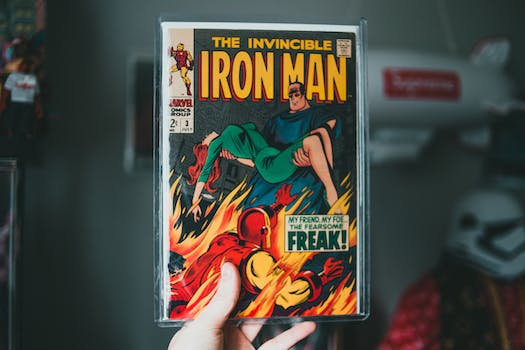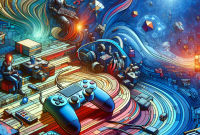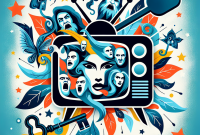
The Marvel Cinematic Universe: A Decade of Superhero Success
-
Table of Contents
- Introduction
- How the Marvel Cinematic Universe Changed the Superhero Genre
- The Impact of the Marvel Cinematic Universe on Pop Culture
- Exploring the Characters of the Marvel Cinematic Universe
- The Evolution of Visual Effects in the Marvel Cinematic Universe
- Analyzing the Music of the Marvel Cinematic Universe
- Q&A
- Conclusion
!
“Experience the Epic Journey of the Marvel Cinematic Universe: 10 Years of Superhero Adventure!”
Introduction
The Marvel Cinematic Universe (MCU) has been a major success since its inception in 2008. Over the past decade, the MCU has become one of the most successful franchises in film history, with over 20 films released and billions of dollars in box office revenue. The MCU has become a cultural phenomenon, with its characters and stories becoming a part of the public consciousness. From Iron Man to Black Panther, the MCU has introduced us to a wide variety of superheroes and villains, and has taken us on an epic journey through the Marvel universe. With the release of Avengers: Endgame in 2019, the MCU has reached its climax, and it is clear that the franchise will continue to be a major success for years to come.
How the Marvel Cinematic Universe Changed the Superhero Genre
The Marvel Cinematic Universe (MCU) has revolutionized the superhero genre since its inception in 2008. The MCU has changed the way we view superheroes, from the way they are portrayed on screen to the way they are written in comics.
The MCU has brought a new level of realism to the superhero genre. The characters are more relatable and their stories are more grounded in reality. The MCU has also changed the way superheroes are portrayed on screen. Instead of the traditional spandex-clad heroes, the MCU has introduced a more diverse range of characters, from the street-level heroes of the Defenders to the cosmic heroes of the Guardians of the Galaxy.
The MCU has also changed the way superheroes are written in comics. The stories are more complex and the characters are more nuanced. The MCU has also introduced a new level of diversity to the genre, with characters of different races, genders, and sexual orientations.
The MCU has also changed the way superhero movies are marketed. Instead of focusing on individual heroes, the MCU has created a shared universe that allows for crossover events and team-ups. This has allowed for a more expansive and interconnected story, which has been embraced by fans.
The MCU has changed the superhero genre in many ways, from the way superheroes are portrayed on screen to the way they are written in comics. The MCU has brought a new level of realism and diversity to the genre, and has allowed for a more expansive and interconnected story. The MCU has revolutionized the superhero genre and has set a new standard for superhero movies.
The Impact of the Marvel Cinematic Universe on Pop Culture
The Marvel Cinematic Universe (MCU) has had a profound impact on pop culture since its inception in 2008. From its groundbreaking films to its expansive universe of characters, the MCU has become a cultural phenomenon that has changed the way we view and experience movies.
The MCU has revolutionized the way we watch movies. Its interconnected storylines and characters have created a shared universe that allows viewers to experience a larger story arc over multiple films. This has allowed for a more immersive experience for viewers, as they can follow the characters and storylines across multiple films. This has also allowed for more complex and engaging stories to be told, as the MCU has been able to explore themes and ideas that would not have been possible in a single film.
The MCU has also had a major impact on the way we view superheroes. The MCU has taken the traditional superhero narrative and expanded it to include a variety of characters and stories. This has allowed for a more diverse representation of superheroes, as well as a more nuanced exploration of the themes and ideas associated with them.
The MCU has also had a major impact on the way we consume media. The success of the MCU has led to an explosion of superhero-related content, from television shows to video games. This has allowed for a more immersive experience for fans, as they can explore the MCU in a variety of ways.
Finally, the MCU has had a major impact on the way we view pop culture. The success of the MCU has led to a resurgence of interest in comic books and superheroes, as well as a renewed appreciation for the genre. This has allowed for a more diverse representation of characters and stories, as well as a more nuanced exploration of the themes and ideas associated with them.
The Marvel Cinematic Universe has had a profound impact on pop culture, and its influence will continue to be felt for years to come. From its groundbreaking films to its expansive universe of characters, the MCU has changed the way we view and experience movies, and has allowed for a more diverse representation of superheroes and stories.
Exploring the Characters of the Marvel Cinematic Universe

The Marvel Cinematic Universe (MCU) has become one of the most successful film franchises in history, with its expansive cast of characters captivating audiences around the world. From Iron Man to Captain Marvel, the MCU has created a diverse and dynamic range of characters that have become beloved by fans. In this blog post, we’ll take a closer look at some of the most iconic characters in the MCU and explore what makes them so special.
First up is Tony Stark, the genius, billionaire, playboy philanthropist who kickstarted the MCU with his debut in Iron Man. Stark is a complex character who is driven by his own ambition and ego, but also has a strong sense of justice and morality. He is a self-made man who is willing to put himself in harm’s way to protect the innocent, and his wit and charm make him one of the most beloved characters in the MCU.
Next is Steve Rogers, aka Captain America. Rogers is a symbol of patriotism and courage, and his unwavering sense of justice and morality make him a hero to many. He is a man out of time, but his values remain the same, and he is willing to do whatever it takes to protect the innocent and uphold justice.
Thor is another iconic character in the MCU. He is the God of Thunder, and his strength and power make him a formidable force. But Thor is more than just a powerful warrior; he is also a compassionate and wise leader who is willing to put himself in harm’s way to protect those he loves.
Finally, we have Black Widow, the master spy and assassin. Black Widow is a complex character who is driven by her own sense of justice and morality. She is a formidable fighter and a master of espionage, but she also has a softer side that is often overlooked.
These are just a few of the many characters in the MCU, and each one has their own unique story and personality. From Iron Man to Black Widow, the MCU has created a diverse and dynamic cast of characters that have become beloved by fans around the world.
The Evolution of Visual Effects in the Marvel Cinematic Universe
The Marvel Cinematic Universe (MCU) has become one of the most successful film franchises in history, and its success is largely due to its stunning visual effects. From the first Iron Man movie in 2008 to the most recent Avengers: Endgame, the MCU has consistently pushed the boundaries of what is possible with visual effects. In this blog post, we’ll take a look at how the visual effects of the MCU have evolved over the years.
When Iron Man was released in 2008, it was a groundbreaking film in terms of visual effects. The film featured a number of impressive effects, including the Iron Man suit, which was created using a combination of CGI and motion capture. The film also featured a number of other impressive effects, such as the destruction of the Stark Industries building and the climactic battle between Iron Man and the Iron Monger.
Since then, the visual effects of the MCU have only gotten better. In The Avengers, released in 2012, the effects were taken to a whole new level. The film featured a number of impressive effects, including the destruction of New York City and the climactic battle between the Avengers and the Chitauri.
In the years since The Avengers, the visual effects of the MCU have continued to improve. In Guardians of the Galaxy, released in 2014, the effects were even more impressive. The film featured a number of impressive effects, including the destruction of Xandar and the climactic battle between the Guardians and Ronan the Accuser.
In recent years, the visual effects of the MCU have become even more impressive. In Avengers: Infinity War, released in 2018, the effects were taken to a whole new level. The film featured a number of impressive effects, including the destruction of Thanos’s ship and the climactic battle between the Avengers and Thanos.
Finally, in Avengers: Endgame, released in 2019, the effects were taken to an even higher level. The film featured a number of impressive effects, including the destruction of Thanos’s ship and the climactic battle between the Avengers and Thanos.
As we can see, the visual effects of the MCU have come a long way since Iron Man was released in 2008. The effects have become increasingly impressive with each new film, and it’s clear that the MCU will continue to push the boundaries of what is possible with visual effects in the years to come.
Analyzing the Music of the Marvel Cinematic Universe
The Marvel Cinematic Universe (MCU) has become one of the most successful film franchises in history, and its music has played a major role in its success. From the iconic theme of Iron Man to the sweeping orchestral scores of the Avengers films, the music of the MCU has become an integral part of the experience. In this article, we’ll take a look at the music of the MCU and how it has helped to shape the franchise.
The MCU has featured a wide variety of musical styles, from the classic orchestral scores of Alan Silvestri to the more modern electronic soundtracks of Brian Tyler. Each composer has brought their own unique style to the franchise, creating a diverse and exciting soundscape. Silvestri’s scores are often characterized by sweeping strings and powerful brass sections, while Tyler’s soundtracks feature more modern electronic elements.
The music of the MCU has also been used to great effect in creating tension and suspense. Composers such as Tyler Bates and Henry Jackman have used their music to build tension and create a sense of dread in some of the franchise’s most intense moments. The music of the MCU has also been used to great effect in creating a sense of awe and wonder, with the sweeping orchestral scores of Silvestri and Tyler creating a sense of grandeur and spectacle.
The music of the MCU has also been used to great effect in creating a sense of emotion and connection with the characters. Composers such as Michael Giacchino and Mark Mothersbaugh have used their music to create a sense of intimacy and emotion, allowing the audience to connect with the characters on a deeper level.
Overall, the music of the MCU has been an integral part of the franchise’s success. From the iconic theme of Iron Man to the sweeping orchestral scores of the Avengers films, the music of the MCU has helped to create a unique and exciting soundscape. The music of the MCU has also been used to great effect in creating tension, suspense, awe, wonder, and emotion, allowing the audience to connect with the characters on a deeper level.
Q&A
Q1: What is the Marvel Cinematic Universe?
A1: The Marvel Cinematic Universe (MCU) is a shared universe of superhero films, television series, and digital series based on characters that appear in publications by Marvel Comics. The MCU is the largest and most successful film franchise of all time, having grossed over $22 billion at the global box office.
Q2: How many films have been released in the MCU?
A2: As of 2021, there have been 23 films released in the MCU.
Q3: What is the highest grossing film in the MCU?
A3: The highest grossing film in the MCU is Avengers: Endgame, which grossed over $2.797 billion at the global box office.
Q4: Who are some of the main characters in the MCU?
A4: Some of the main characters in the MCU include Iron Man, Captain America, Thor, Black Widow, Hulk, Hawkeye, Scarlet Witch, Vision, Doctor Strange, Spider-Man, Black Panther, Captain Marvel, and Ant-Man.
Q5: What is the upcoming film in the MCU?
A5: The upcoming film in the MCU is Black Widow, which is set to be released on July 9, 2021.
Conclusion
The Marvel Cinematic Universe has been a remarkable success over the past decade, with its films grossing billions of dollars and becoming some of the most beloved films of all time. The MCU has created a shared universe of characters and stories that have captivated audiences around the world. It has also set a new standard for superhero films, inspiring other studios to create their own shared universes. The MCU has become a cultural phenomenon and will continue to be a major force in the entertainment industry for years to come.






